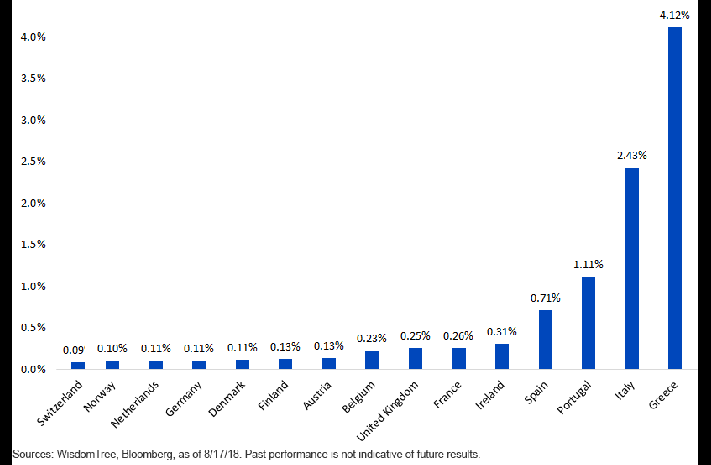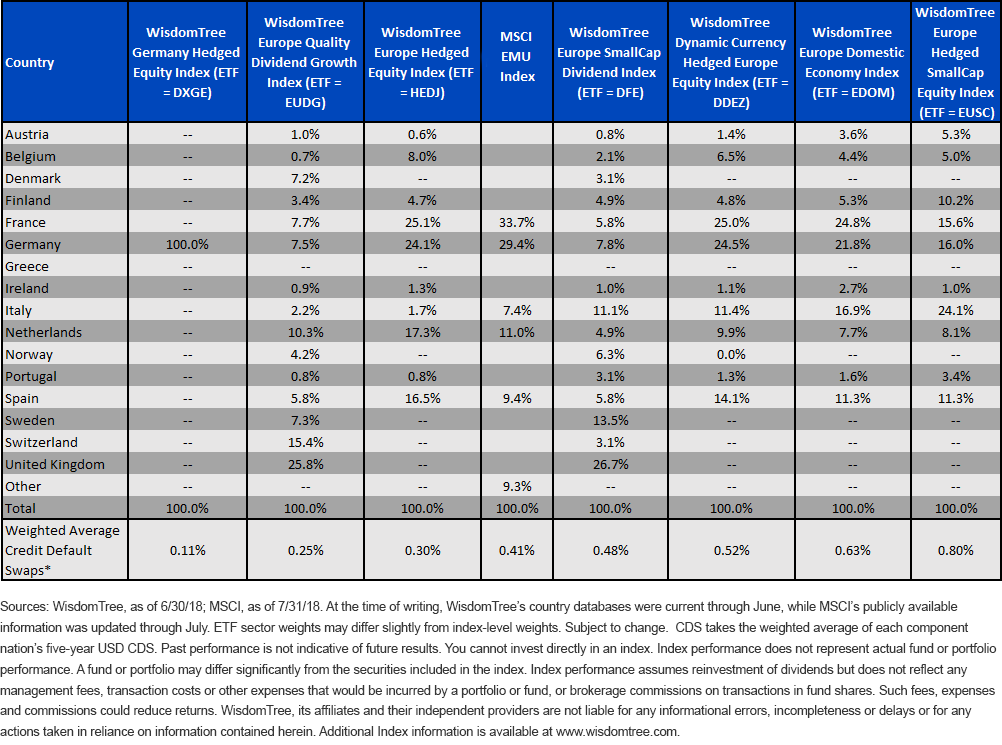Mario Draghi: Turkey’s Helper?


This is Part 2 of a two-part series on Turkey’s crisis and the implications for Europe. In Part One, Getting More Defensive in European Portfolios, we identified the WisdomTree Germany Hedged Equity Fund (DXGE) and the WisdomTree Europe Hedged Equity Fund (HEDJ) as two ETFs that may help minimize European financial sector risk, specific bank risk from the four institutions that hold Turkish debt in size, and currency risk.
Erdogan’s Luck
Turkey’s President, Recep Tayyip Erdogan, may find a four-leaf clover in the form of an implicit bailout from European Central Bank (ECB) president Mario Draghi.
According to the Bank for International Settlements, Spanish, French and Italian banks own $83.3bn, $38.4bn and $17bn of Turkish paper.1 The banks with exposure include ING (Netherlands), BBVA (Spain), BNP Paribas (France) and UniCredit (Italy). In looking at the latter four eurozone banks, we found WisdomTree ETFs tracking European stocks all have lower exposure to them than MSCI EMU (European Monetary Union), with some of our European funds holding none of those 4 banks at all.
Refugees as a Political Weapon
Our minds are on the 3.5 million Syrian refugees in Turkey. Erdogan can gain leverage on Europe by threatening to send them westward, which would increase voter support for hardline immigration hawks such as Matteo Salvini, the nativist power broker in Italy. Draghi, a Europhile, knows that an exacerbation of the migrant crisis threatens the European Project.
Using the refugees for negotiating leverage, Erdogan can demand debt haircuts. If so, that would seemingly come hand-in-hand with Draghi attempting to push the euro down to help European competitiveness amid bank balance sheet headline risk. Remember, all four banks in question were hanging by a string during the Lehman and Greek crises.
In other words, we think Draghi is going to surprise the market not by being “hawkish,” as some are predicting, but by doing the opposite: being dovish, bringing pain to long euro bets while maybe even pleasantly surprising European equities.
How That Happens
The ECB currently is on pace to end its €30 billion-per-month bond purchase program (which used to be €60 billion) in just a few months. The Wall Street consensus is that there is a 1-in-3 chance that the central bank will hike its policy rate in 2019’s second half. We think the probability is lower.
Figure 1 shows the pecking order of national risk in Europe using five-year credit default swaps (CDS). The safe domiciles in northern Europe are priced as low as .09%, meaning that it costs about $9,000 per year to insure against default of $10 million of government bonds. In contrast, CDS for riskier Italy would be $242,000 per year for $10 million of sovereign bonds.
Of the banks that are on the radar—ING, BNP Paribas, BBVA and UniCredit—two are in the big-risk countries (Spain and Italy).
Figure 1: Five-Year Credit Default Swaps, Sovereign Debt, USD

Figure 2 shows the country exposures of the seven WisdomTree European equity Indexes that have ETFs tracking them, along with the MSCI EMU Index. At the bottom is the weighted-average CDS prices of the component nations. The equity Indexes that are tracked by DXGE, EUDG (the WisdomTree Europe Quality Dividend Growth Fund) and HEDJ currently have low weighted-average CDS prices of 0.11%, 0.25% and 0.30%, respectively. For comparison, the weighted-average CDS prices for nations in the MSCI EMU Index are a riskier 0.41%.
Figure 2: European Equity Country Weights + Weighted-Average 5-Year CDS Prices

Our Solutions
Of the seven WisdomTree ETFs for Europe (above), the ones with no exposure to the four banks are: EUDG (European quality dividend growth), DXGE (Germany, currency-hedged), WisdomTree Europe Hedged SmallCap Equity Fund (EUSC) and one we haven’t mentioned yet, the WisdomTree Europe SmallCap Dividend Fund (DFE). The MSCI EMU Index currently has more exposure to the four risky banks than every one of our ETFs, not just these ones.
The WisdomTree ETFs that have lower Financials sector weights than MSCI EMU are: EUDG (European quality dividend growth), DXGE (Germany, currency hedged) and HEDJ (exporters, currency hedged).
The lowest country risk ETFs as gauged by sovereign credit default swaps are: DXGE (Germany, currency hedged), EUDG (multifactor) and HEDJ (exporters, currency hedged).
1Source: Silvia Amara, “If Turkey Implodes, Here’s Who Else Gets Hurt,” CNBC, 8/10/18.
Important Risks Related to this Article
There are risks associated with investing, including possible loss of principal. Foreign investing involves special risks, such as risk of loss from currency fluctuation or political or economic uncertainty. These Funds focus their investments in Europe, thereby increasing the impact of events and developments associated with the region which can adversely affect performance. Dividends are not guaranteed and a company currently paying dividends may cease paying dividends at any time. Investments in currency involve additional special risks, such as credit risk and interest rate fluctuations. As these Funds can have a high concentration in some issuers, the Funds can be adversely impacted by changes affecting those issuers. These Funds invest in the securities included in, or representative of, their Index regardless of their investment merit, and the Funds do not attempt to outperform their Index or take defensive positions in declining markets. Please read each Fund’s prospectus for specific details regarding the Fund’s risk profile.


